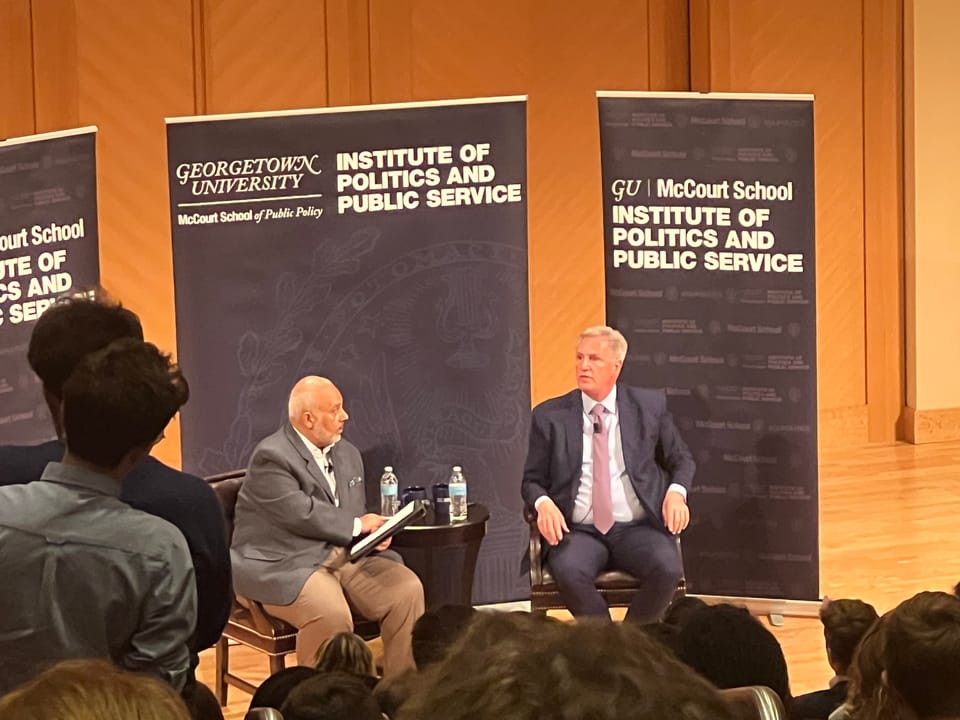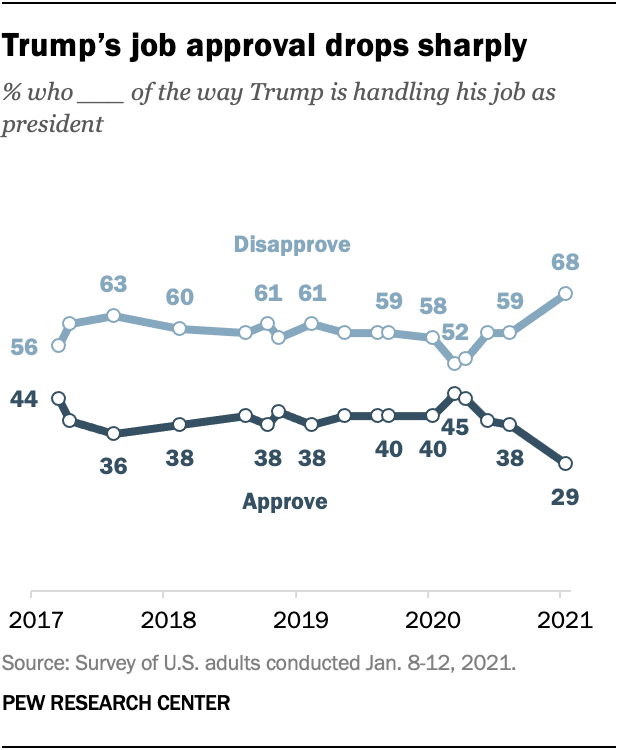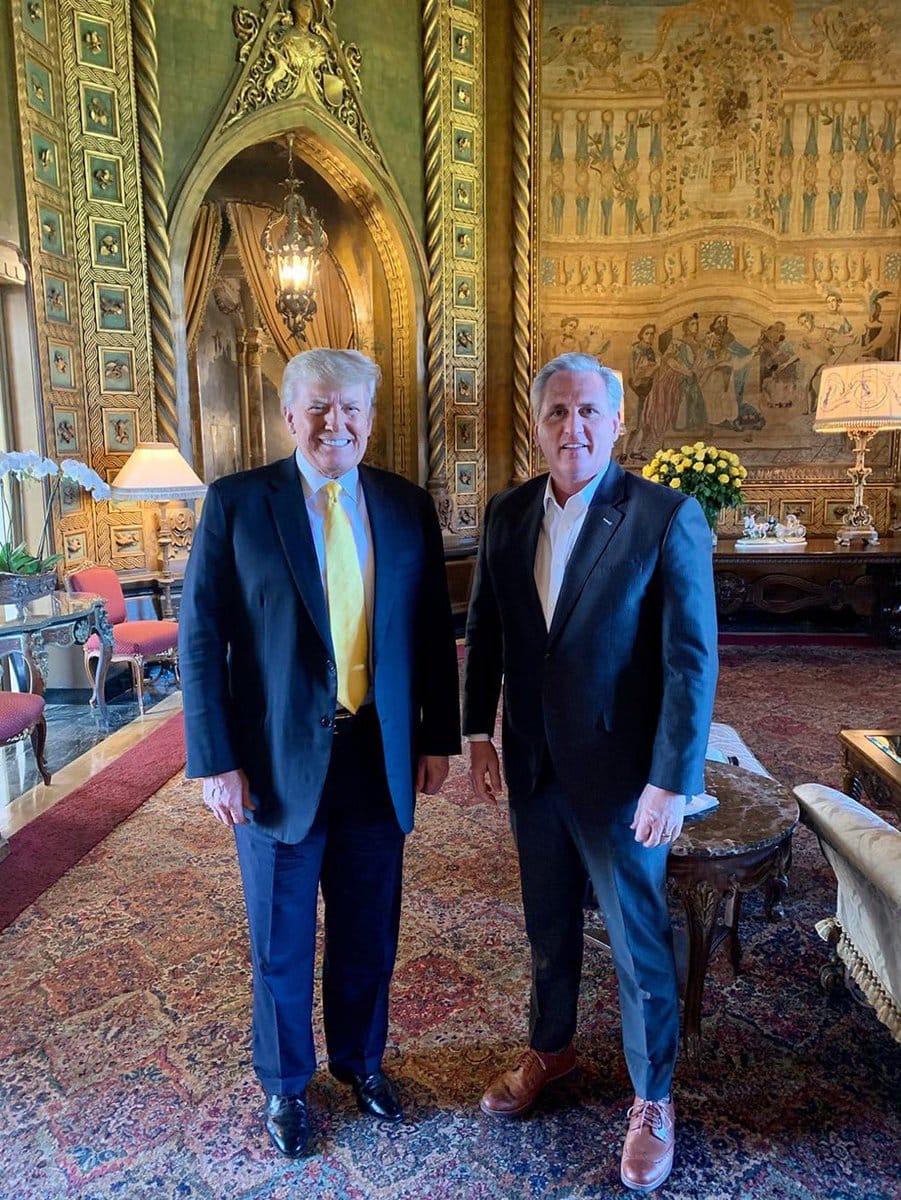Kevin McCarthy’s Trumpworld tryout

Good morning! It’s Wednesday, April 10, 2024. Election Day is 209 days away. If this newsletter was forwarded to you, subscribe here. If you want to contribute to support my work, donate here.
It’s hard to remember now, but for a few weeks in January 2021, there was a brief moment when it seemed the Republican Party might wash its hands of Donald Trump.
With the shock of the January 6th riot — and his nonchalant response to it — still fresh, Trump was utterly alone and isolated in the party. He was stripped of his megaphones on Twitter and Facebook. Major donors started to flee. It was even considered possible that Mitch McConnell might lead Senate Republicans in voting to convict him in an impeachment trial.
Republican politicians said things like “Count me out, enough is enough” (Lindsey Graham, publicly) and “I’ve had it with this guy” (Kevin McCarthy, privately). The feeling was mutual: Trump reportedly told then-RNC chair Ronna McDaniel that he was considering leaving the GOP and starting his own political movement, the Patriot Party, from his Mar-a-Lago exile.

The political rehabilitation that followed — from Trump considering leaving the party to taking over all its major structures; from watching his approval rating dip to an all-time low and now rise to an all-time high — is one of the most extraordinary stories in recent political history. It also has many causes, including the weak primary candidacies waged against him and the fact that many Republican voters never wavered in their devotion to him. Political scientists debate the extent to which the endorsements of party elites matter to voters in an anti-elite era; it is possible that nothing in this story would have changed if GOP leaders had maintained their January 2021 rhetoric for the next three years.
But if you remember the state of Trump’s political isolation on the morning of January 7th, you have to at least be curious whether it would have persisted — at least to a degree that would have denied him the GOP nomination — if someone like Kevin McCarthy stuck to his guns and continued treating Trump as a political non-entity in the months that followed.
McCarthy himself does not seem to share that curiosity. The then-House Republican leader’s visit to Trump at Mar-a-Lago on January 28, 2021, is often cited — by Trump critics, at least — as a turning point in when it became kosher for GOP leaders to embrace Trump again. “Just like that, everything changed,” former Rep. Adam Kinzinger (R-IL), who was in Congress at the time, has said of McCarthy’s visit.
Speaking at Georgetown University on Tuesday night, McCarthy defended his Mar-a-Lago sojourn, comparing the visit to simply calling on a friend who had fallen on hard times.
“I also have another philosophy,” McCarthy told the audience of students when asked about the Mar-a-Lago trip. “Whether I like you or dislike you, if something bad happens in your life, I want to be the first person you call. If there’s one thing I’ve learned about this, we have too many Facebook friends. We don’t have real friends. The first things that happens when something bad happens in your life is everybody abandons you. I want to call you, not to help you, but I just want to know how you’re doing as a person. And I’ll do that on both sides of the aisle.”
Of course, the “friend” in this analogy is the same person who, just weeks before, McCarthy had said “bears responsibility” for an attack on McCarthy’s place of work, which the “friend” excused by telling him, “Well, Kevin, I guess these people are more upset about the election than you are.”
The most interesting part of McCarthy’s comments, besides his casually shrugging off a visit that at least potentially changed the course of history, was his tacit acknowledgment of Trump’s isolation in that period. “The first thing that happens when something bad happens in your life is everybody abandons you.” You don’t often hear Republicans discussing that brief, easily-forgotten spell when they left Trump in the political wilderness. But if McCarthy felt that that abandonment was in any way justified — or that his trip played a role in ending it — he didn’t show it.
In fact, McCarthy said, he did not expect the meeting to cause much of a splash. “Did I think all the attention would go out?” he said. “No.” (McCarthy added that he did not expect the meeting to even be made public. He said that Trump asked him who he thought leaked it, to which McCarthy said he replied, “You.” Trump responded: “Well, it’s good for both of us, you know.”)

Listening to McCarthy speak, in a talk titled, to considerable online mockery, “How Strong is Our Democracy?”, he sounded like a man unleashed — mostly. McCarthy’s political career, remember, has taken the opposite trajectory of Trump’s. Just a few months ago, he was living out his lifelong dream, serving as House speaker, sitting second in the presidential line of succession. Now, he is a private citizen, having left Congress after being unceremoniously ousted from the speakership by his colleagues.
When it came to discussing his own joblessness — and the circumstances that led to it — McCarthy was surprisingly open, cracking jokes and settling scores from the sidelines.
“I’ll give you the truth why I’m not speaker: it’s because one person, a member of Congress, wanted me to stop an ethics complaint because he slept with a 17-year-old,” he said, in an unmistakable reference to Rep. Matt Gaetz (R-FL), who was investigated (and never charged) in a sex trafficking probe before leading the push to remove McCarthy. (As the audience gasped, McCarthy later qualified his remarks: “Did he do it or not? I don’t know.” But then he added, “There’s other people in jail because of it.”)
The one exception to his newfound liberation was speaking about Trump. When McCarthy was asked about Congress, he seemed happy to talk freely about internal House dynamics, recounting backroom meetings and machinations with equal parts bitterness and relish. At some points, he was was self-deprecating: “I’ll stay a little longer if they keep asking [questions],” McCarthy said as the event was winding down. “I don’t have a job anymore.” At others, he was just deprecating: “We looked like the most restricted country club in America,” he said of the House Republican Conference circa 2019.
But, then, he’d be asked about Trump, and he would snap back to form, as if he was still a party leader pretending he hadn’t seen the latest presidential tweets. “I don’t know if he’s said that exact quote,” McCarthy said when asked about Trump saying that immigrants were “poisoning the blood” of the country. “I have never heard him say that.”
“Nobody’s perfect,” he said when he was told that Trump had, in fact, said it repeatedly. “I don’t think that’s what President Trump believes.”
At another point, McCarthy was asked by a student, “When did you find out about Trump’s fake elector scheme and why did you not do anything to stop it?”
“I didn’t know that he had a fake elector scheme...I don’t know about a scheme, I never found out about a scheme,” McCarthy responded. (Trump worked with allies after the 2020 election to organize alternative elector slates who prepared certificates falsely asserting that he won states he did not win. The efforts have been widely publicized, including in a federal indictment.)
McCarthy said “yes” when asked if Joe Biden won the 2020 election, but defended his votes against certifying the results in Arizona and Pennsylvania by explaining: “Challenging something doesn’t mean you’re overturning something. A challenge is a challenge.” He also compared Trump’s attempts to pressure state and federal officials to declare his 2020 loss a victory to Hillary Clinton’s comments, made after the 2016 election was already certified, seeding doubt about the outcome.
Asked about Republicans who defend the January 6th rioters — Trump has called them “patriots” and “hostages” and said he would pardon them in a second term — McCarthy responded, “I don’t know that they’re defending the people who stormed the Capitol, but I think they’re defending the due process about how long, if we’re now sitting almost four years later, why are they sitting in jail and not having the ability to go to court? Are they being treated fairly? I think that’s a great question that I hear from people on the other side.”
McCarthy was never asked if he would consider taking a job in a second Trump administration, but it was hard not to wonder — listening to his obfuscations, even as a former officeholder, about the presumptive nominee — whether McCarthy’s return to the speaking circuit was partially a tryout for a Trump-assisted comeback to political office.
Bloomberg News has already reported that McCarthy is seen by Trump advisers as a “top candidate” to serve as White House chief of staff if the former president returns to the Oval Office. “McCarthy, who turned down the job in Trump’s last term because he wanted to serve as speaker, has assets that Trump views positively including an understanding of Capitol Hill, federal agencies and budgets,”Bloomberg reported.
McCarthy, who has little other reason not to speak about Trump as freely as he does about, say, Matt Gaetz — it’s not as if the former president was any help in his attempts to keep the speakership — already appeared to be preparing Tuesday night for a second tour in Trump’s inner circle.
If Trump does return McCarthy to political relevance, it would be a fitting gift for the man who arguably did more than any other to lift Trump back into the GOP’s good graces. Not that McCarthy sees it that way, of course.
Thanks for reading.
I get up each morning to write Wake Up To Politics because I’m committed to offering an independent and reliable news source that helps you navigate our political system and understand what’s going on in government.
The newsletter is completely free and ad-free — but if you appreciate the work that goes into it, here’s how you can help:
- Donate to support my work or set up a recurring donation (akin to a regular subscription to another news outlet).
- Buy some WUTP merchandise to show off your support (and score a cool mug or hoodie in the process!)
- Tell your family, friends, and colleagues to sign up at wakeuptopolitics.com. Every forward helps!
If you have any questions or feedback, feel free to email me: my inbox is always open.
Thanks so much for waking up to politics! Have a great day.
— Gabe
